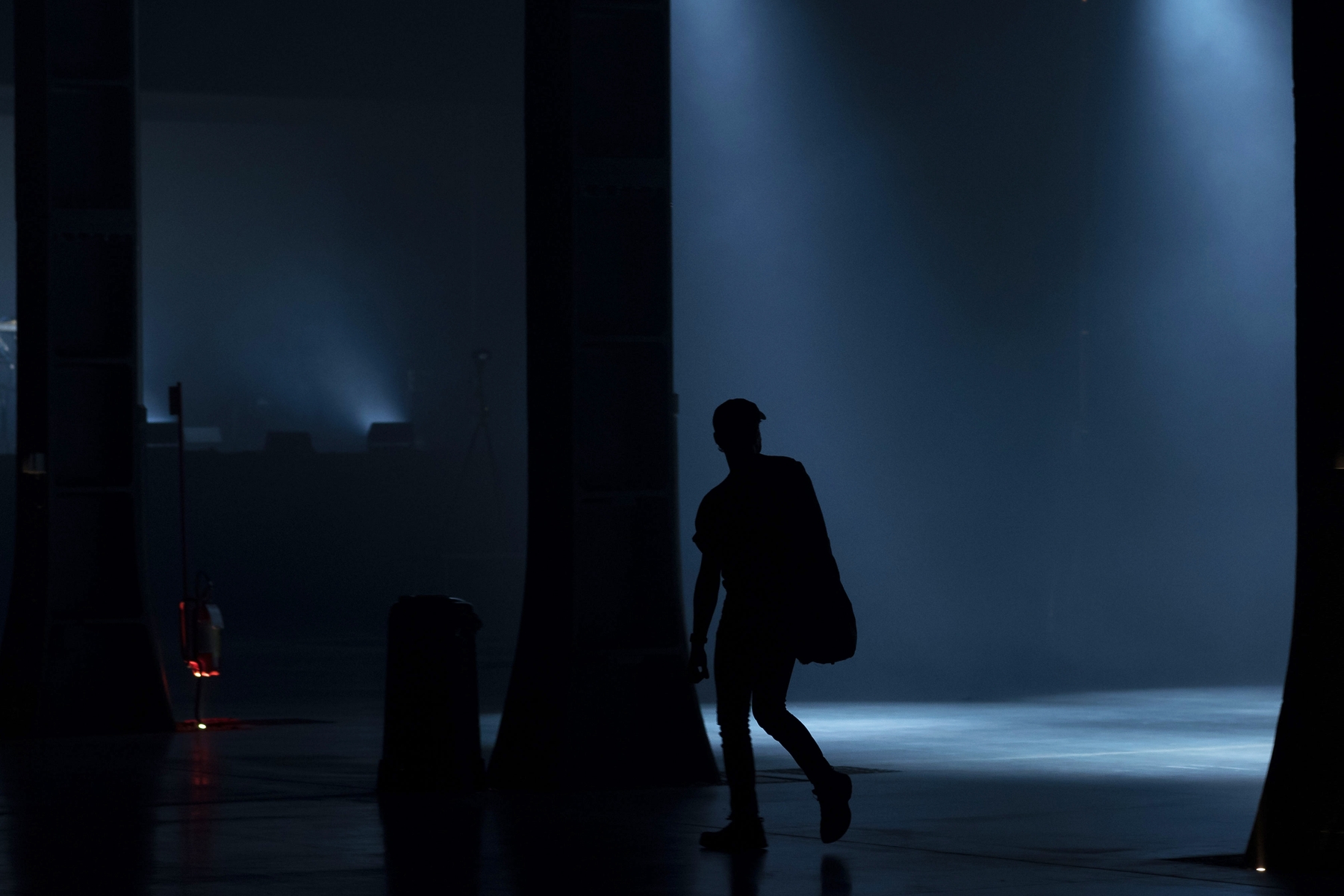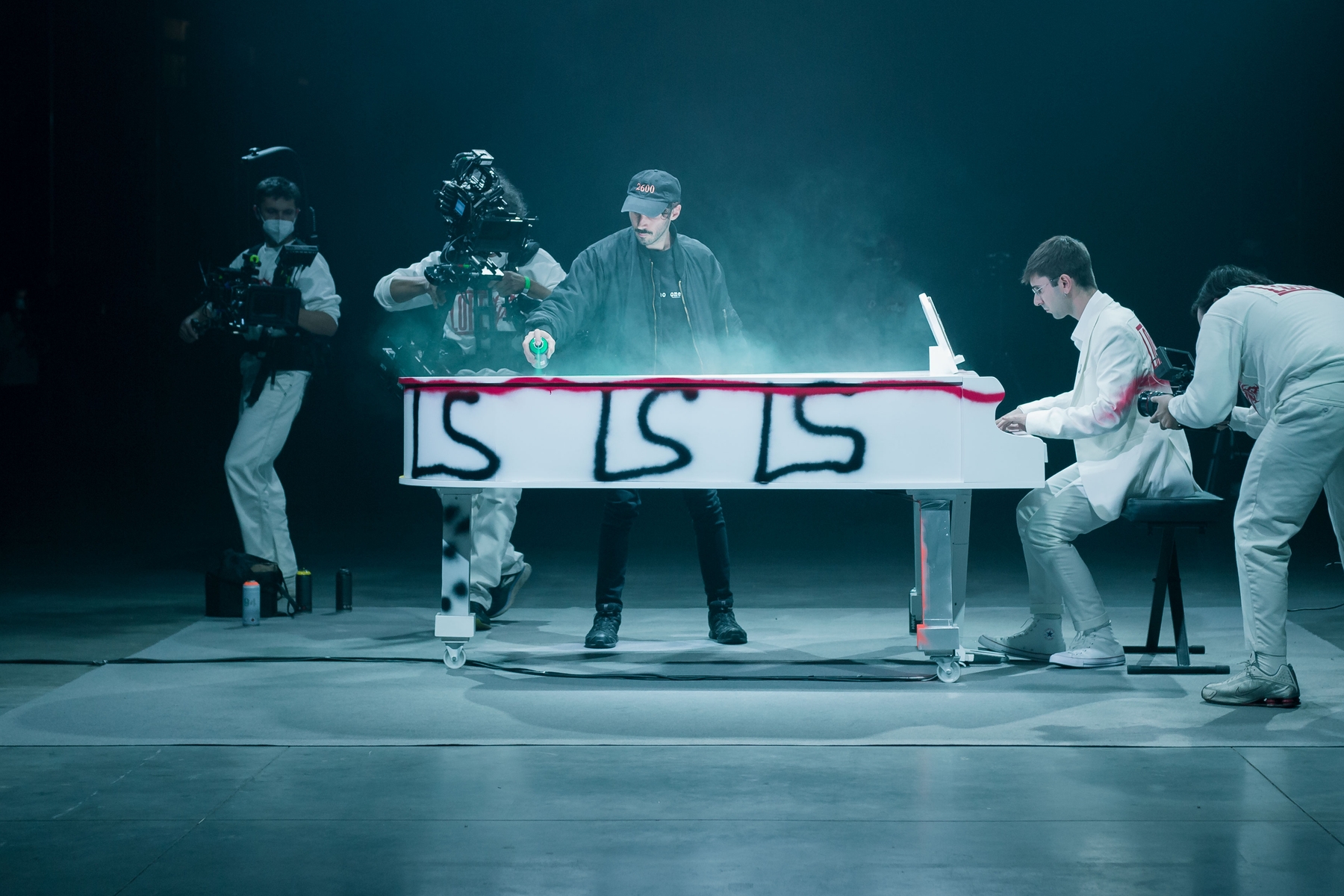Lorenzo Senni on expectations, vandalising music and being alone
As 2021 is approaching, we catch up with Italian artist extraordinaire Lorenzo Senni.

Do you feel like it's your duty to translate your ideas towards your work, as much as possible?
It's not my duty, it's part of what I do. I have thoughts, I conceive ideas and concepts, I produce sounds and images, and I write down words.
What about your feelings?
Georges Seurat says “Some say they see poetry in my paintings, I see only science.”
Do you owe anything to anybody?
Maybe I own myself a daily match. It's more like a constant challenge, a duel I wake up to and it's already on.
Describe the effort.
I can’t say I enjoy it, but I’m still here. I realise it is a condition that is implicit in what I do, at least in how I approach it.
How is the balance between pleasure and pain in that daily process?
Think of a roller coaster. You are excited about it, you wait a for a long queue, then when you are walking to the car you ask yourself why you are doing that, then you are scared, hate yourself, a second later you are euphoric and then scared again. Soon enough, you feel sad and just want it to be over. Then you walk out and feel relieved. Looking at the photos you buy at the exit, you think about that crazy journey, and go back to the queue.

Sometimes I force myself to do the opposite of what I want, maybe because there is something I dread in the fact/process of being me, and the awareness of what others might expect. It's like I don't want to please myself, or anybody. I prefer to do something that breaks all those things up.
Do you fight your own ideas?
Yes. But I think it’s not an instinctive, passionate or spectacular fight. It’s more like trench warfare, a constant tension I’m looking for within myself.
Do you think about what “others” expect?
A big part of my work it’s based on the opposite. Using the the Trance build-up as a reference and starting point, to make my own sabotaged version, reversing its paradigms, really goes against the audience expectations.
I do care about expectation at a deeper level — it's inevitable — but I don't experience it with anxiety. I often find myself, while I make music in the studio, having mental conversations with colleagues I respect. It's an animate conversation where I talk about what I'm doing and why.
I could imagine that with your type of work, not being in the physical presence of many other people must be odd at the moment, to say the least. Is it?
Perhaps it is weirder to end up performing in front of so many people, when 99.9% of the time you are alone.
Maybe you are alone even when you are on stage.
For sure. How does it feel to make and experience music on your own, in general?
I try to create something that keeps me satisfied and gives acceptable answers to a number of question I ask myself. It certainly has to do with mental and physical loneliness, at least as I approach it. As I also believe that “pleasure lies in the process" —even if it's tiring and consuming — I'm ok to be on my own.
The main problem nowadays it's not being able to experience all the other social aspects around music and art. Live concerts, dance floors, openings, auditoriums, record shops, exhibitions. I'm looking forward to being back on stage, and backstage.

Do you look for ways to propel yourself forward in general?
I live with the illusion that my work is saving me.
Do you feel like you have to move away from yourself, your music, in order to make good work?
It’s not really about moving away from myself; but rather trying to move back to when I was a child. Like in Zen in the Art of Archery, trying to get rid of any goal in order to hit the target.
You set rules in how you make work. What are they meant to serve or help?
I called my last album Scacco Matto (“checkmate” in Italian) cause, in the last years, all these rules layered up until a breaking point. Rules, to me, are a way to make things coherent, justify certain choices. They also allow me to remove specific aspects and problems I might have solved already.
It is very important for me to work with limitations in order to explore materials and ideas more in depth.
Here is an image to help explain this: Think of a torrent that flows quietly. If you put stones that fill part of the watercourse, the speed and power with which the water flows increases. The flow gets stronger and sharp. The artist needs to do this without compromising the flow of course, and avoid bottlenecks or flooding.
Vandalize Music. Is the title of this piece meant to be explanatory?
If there is something I can speak about, it's my work. The micro and macro choices I make have a solid explanation related to a specific concept. It will never be "because I like it this way" or “I looked at the stars and I composed this piece.” Most artists justify their work with such empty statements.
I grew up reading artists interviews and listening to them presenting their work. I love that and I love to help the audience to find a good way into my work. It's personal and subjective of course, but I deal with it 16-18 hours a day, so I believe I can help.
The title of a work can help give a clue. To me it's a piece of the puzzle, or sometimes a more direct suggestion.
In general, how is the process for you to name a piece of music?
To me the title supports the idea, doesn't serve as a wallpaper or set design. If the concept it's somehow sonically well developed and finds correspondences in music then it should work all together.



I enjoy your work because to me, it captures a form of unknown, it opens a door. It doesn't really portray anything I would call reality... In a way it feels very unfamiliar and odd. It makes me wonder, are you interested in authenticity?
Let's say you can get rid of everything, then it shouldn't be that hard to be authentic. My parents taught me to accept others for who they are and that to accept myself for who I was. I tried to do that, from being a straight-edge kid hanging out with gabbers, hardcore warriors and drug-dealers, then a computer based musician in a scene of broken guitar-pedals and noise, to a grown rave-voyeur.
I feel like the sound that a sentence makes is important. Sound as an integral part of speech. How do you think about words?
I'm very respectful toward the use of voice in music. It’s probably the most powerful instrument and I never had the courage to work with it.
How does risk manifest in your experience of life?
Is it “risky” to follow an idea that you are very excited about, but that doesn’t get any good feedback at first? I was dumb enough to keep believing in something that only after a while became interesting for others too.
In the real world, I hate risk. At the restaurant I rarely order something I haven’t tried before and I never drive over speed limit.
Any thoughts on what makes "a good artist" in relation to the above?
Maybe a good artist is someone who take the risk of believing in themselves and find a brilliant, sharp and intelligent way to demonstrate the patterns that they observe. Also, someone who can explain why they made choices and the result feels effortless, “done without hard work, apparent ease of execution” as Robert Adams says.
Do you believe you belong to a "movement" of music and if so, how do you describe it?
I think i was. A few years ago I found my self sharing lineups, articles, backstages and late night discussions with artists who were beginning to draw attention. People like Amnesia Scanner, M.e.s.h, Sophie, Arca, Lee Gambe, Holly Herndon, just to name a few. And even if we all sounded different in a way, we certainly had things in common, both sonically and in terms of approach.
In a controversial article by Simon Reynolds this scene has been called “Conceptronica”, a term that I personally find disgusting, but that could help any random graphic designer to understand what he was talking about.

Vandalize Music was a live stream performance, premiered on November 5th, 2020 in Turin, during the OGT for CØC Festival.
Idea by Lorenzo Senni & Daniel Sansavini, art direction by Daniel Sansavini, performance by Lorenzo Senni and Andy Mancini (piano), film direction by No Text Azienda.


